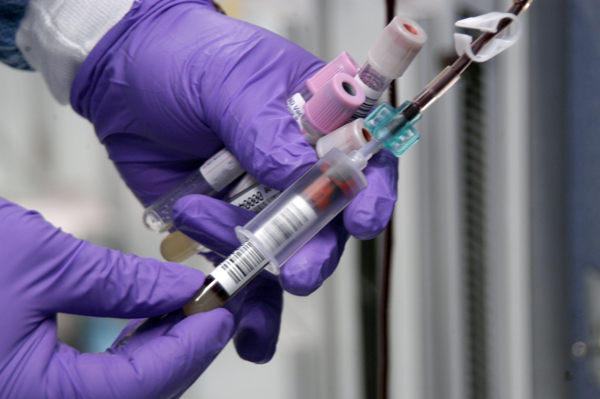A blood test for early detection of Alzheimer’s disease is nearing completion at the Rowan University School of Osteopathic Medicine, in New Jersey. Development of this accurate blood test would give doctors an opportunity to start treating the disease before the onset of symptoms.
Dr. Robert Nagele and his colleagues believe that by using antibodies found in the blood as a biomarker for early stages of Alzheimer’s, physicians will be better able to recommend lifestyle changes that may slow progression of the disease. Nagele and his research group have previously designed other blood-based antibody tests to detect a number of other conditions.
“There are significant benefits to early disease detection because we now know that many of the same conditions that lead to vascular disease are also significant risk factors for Alzheimer’s,” said Nagele. “People found to have preclinical disease can take steps to improve their vascular health, including watching their diet, exercising and managing any weight and blood pressure issues to help stave off or slow disease progression.”
While it is still unknown exactly what causes the onset of Alzheimer’s, researchers believe that the maintenance of good vascular health – as well as a healthy, well-functioning blood-brain barrier – could be integral to preventing the disease. Chronic conditions including high blood pressure, high cholesterol, stroke and diabetes can all put unnecessary pressure on the blood vessels throughout the body.
As neuronal blood vessels become weaker as a result of disease or aging processes, they become slightly permeable and can leak blood components – including antibodies – into the brain. These antibodies can bind to neurons and may promote the accumulation of beta amyloid plaques – a pathological indicator of Alzheimer’s progression.
In addition to Alzheimer’s detection, the blood test developed by Nagele may also be effective in detecting other diseases including breast cancer, multiple sclerosis, and Parkinson’s disease. The team’s research shows that autoantibodies – produced by the body in order to bind to and dispose of cellular debris – can change and malfunction in the presence of disease.
According to the researchers, the antibody profile of an individual with very early stages of Alzheimer’s disease is significantly different from that of a healthy individual, which may allow for early detection. The hope is that this early detection would allow for medical and lifestyle-based interventions, potentially delaying or avoiding the onset of severe symptoms.
“As osteopathic physicians, we constantly tell patients that a healthy lifestyle is the best medicine for preventing disease,” said Dr. Jennifer Caudle, assistant professor of family medicine at Rowan University. “We also know that many people tune out messages about nutrition and exercise until a health crisis gets their attention. I can’t think of a single patient who wouldn’t take steps to prevent the progression of Alzheimer’s if they could directly affect their prognosis.”
The blood test developed by Nagele and his colleagues would certainly fill a void in Alzheimer’s diagnosis – currently, there is no FDA-approved blood test for this purpose. Alzheimer’s disease is one of the top 10 causes of death in the US and it affects approximately 5.3 million people in America.
Sources:
- Researchers Close in on Blood Test for Alzheimer’s Disease – http://www.dddmag.com/news/2015/10/researchers-close-blood-test-alzheimers-disease












Join or login to leave a comment
JOIN LOGIN